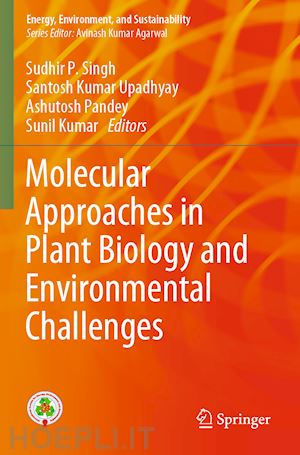Dr. Sudhir P. Singh is currently Scientist at the Center of Innovative and Applied Bioprocessing, Mohali, India. He has been working in the area of molecular biology and biotechnology for more than a decade. He developed novel stringently regulated gene expression systems for inducing male sterility and fertility restoration in plants. He revealed tissue-specific distribution pattern of mineral nutrients in grains and its probable impacts on mineral bioavailability. He provided the first molecular insights into fruit and seed development in custard apple and litchi by analyzing de novo transcriptome of developing fruits and ovules of contrasting genotypes. His de novo transcriptomic study provided the first molecular details of the specialized metabolic pathways in rose-scented geranium. Currently, his main focus of research is gene mining and biocatalyst engineering for development of approaches for transformation of agro-industrial residues and under- or un-utilized side-stream biomass into value-added bioproducts. His group has discovered novel genes for D-allulose 3-epimerase, amylosucrase, xylanase, and cellulase enzymes from the extreme habitat metagenomes. Dr. Singh has over 50 scientific publications and 11 patents (10 filed, and 01 granted) to his credit. He has been conferred International Bioprocessing Association-Young Scientist Award-2017, School of Biosciences-Madurai Kamraj University (SBS-MKU) Genomics Award-2017, and Professor Hira Lal Chakravarty Award, Indian Science Congress Association (ISCA, DST)- 2018. He has also been the recipient of Early Career Research Award, SERB, 2016.
Dr. Santosh Kumar Upadhyay is currently Assistant Professor in the Department of Botany, Panjab University, Chandigarh, India. He has been working in the field of Plant Biotechnology for more than 12 years. His present research focuses in the area of functional genomics. He is involved in the characterization of various insect toxic proteins from plant biodiversity, and defense and stress signaling genes in bread wheat. He has played significant role in identification of whitefly toxic proteins from lower plants and involved in the development of whitefly resistant cotton plants. His research group at PU has characterized numerous important gene families related to the abiotic and biotic stress tolerance and signaling in bread wheat. He has also established the method for genome editing in bread wheat using CRISPR-Cas system. His research contribution led publication of more than 40 research papers in leading journals of international repute. Further, there are more than five national and international patents and five book chapters in his credit. In recognition of his strong research record he has been awarded NAAS Young scientist award 2017-18, NAAS-Associate (2018), INSA Medal for Young Scientist (2013), NASI- Young Scientist Platinum Jubilee Award (2012) and Altech Young Scientist Award (2011). He has also been the recipient of the prestigious DST-INSPIRE Faculty Fellowship (2012), and Early Career Research Award, SERB (2016) from Ministry of Science and Technology, Government of India.
Dr. Ashutosh Pandey is currently Staff Scientist at National Institute of Plant Genome Research, New Delhi, India. His research area is metabolic engineering of flavonoid biosynthesis in plants. He has overexpressed AtMYB12 and AtMYB11 in tomato, which led large-scale differential modulation in transcriptome and flavonoid content in leaf and fruit tissues, and it conferred insect attack tolerance. Further, he coexpressed Arabidopsis transcription factor, AtMYB12, and soybean isoflavone synthase, GmIFS1, genes in tobacco, which enhanced biosynthesis of isoflavones and flavonols resulting in osteoprotective activity. He has characterized isoflavone biosynthesis in Psoralea corylifolia. He developed callus culture for large scale production of rutin with biopesticidal potential. He has performed genome-wide analysis of carotenoid biosynthesis pathway in banana which facilitates metabolic engineering for enhance provitamin A biosynthesis and bioavailability in biofortified banana cell lines. Further, he achieved several folds increase in ß-carotene content by overexpressing phytoene synthase1 of Nendran (NEN-PSY1) in banana cell lines. He has been conferred membership of Indian National Young Academy of Sciences (INYAS) in 2018 (Plant Sciences), INSA Medal for Young Scientist (2017), and the Alexander von Humboldt Post Doctoral Research Fellowship (2016) from Alexander von Humboldt Foundation, Germany.
Dr. Sunil Kumar is currently Principal Scientist and Head, Technology Development Centre, Council of Scientific and Industrial Research-National Environmental Engineering Research Institute (CSIR – NEERI), Nagpur, India. Dr. Kumar has carried out several national and internationally sponsored projects. Most of the projects are related to solid











